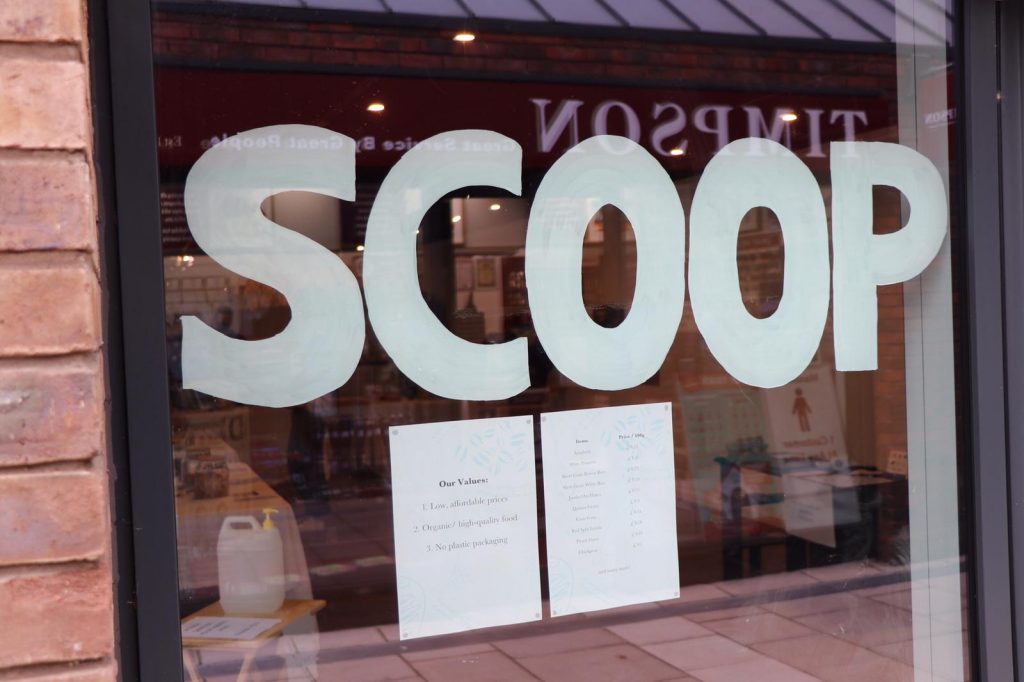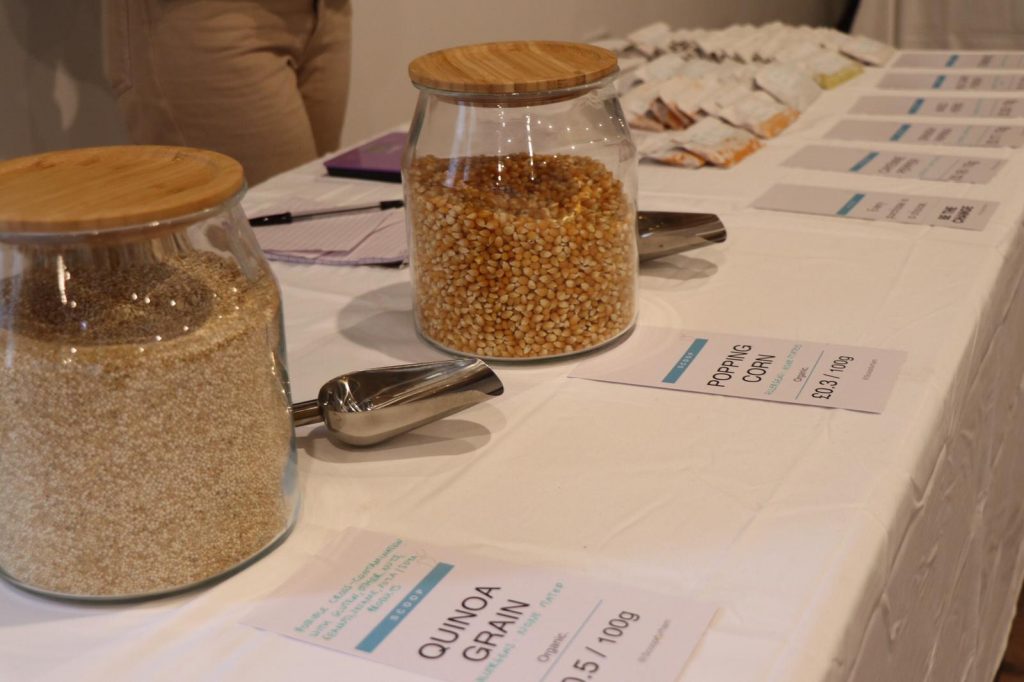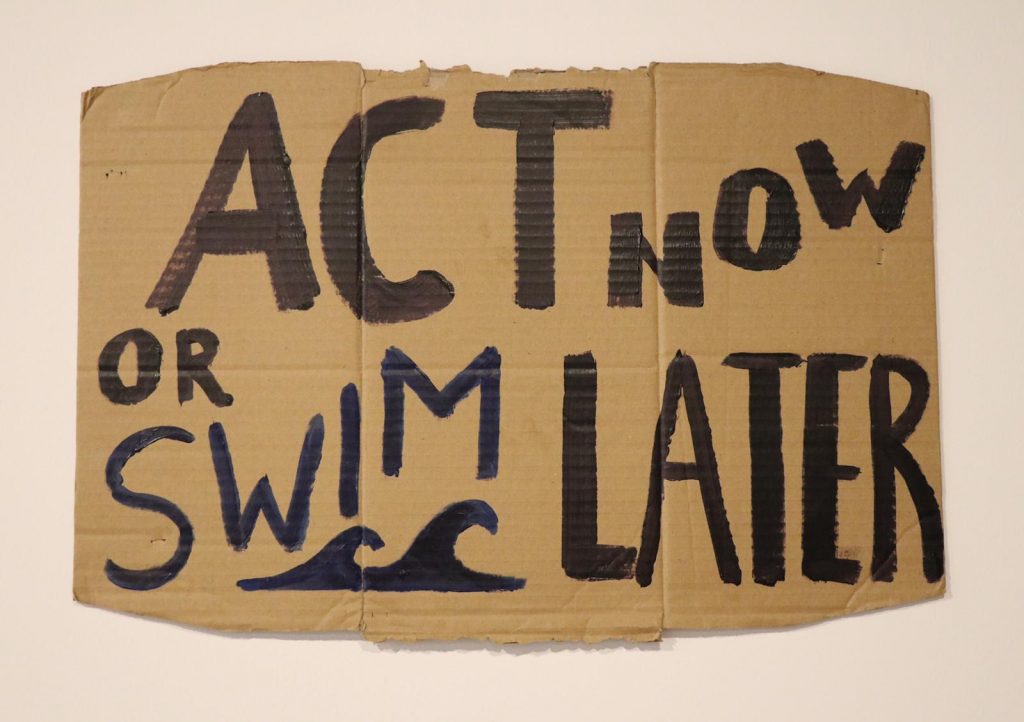After a promising launch last Wednesday, we spoke to Nina Stevens and Davide Bertone, the pioneering co-founders of Scoop Durham who filled us in on their motivation, mission, and what it’s like to get a start-up off the ground.

Image: Stella Baričič
Tell us a little bit about yourselves, Scoop and its values!
Davide: I’m Davide, a third-year philosophy, politics and economics student. Scoop is a zero-waste dried food store, and you can find us at Unit 44, the Riverwalk Durham (opposite Timpson’s).
Nina: I’m Nina, a third-year philosophy student. Scoop really values accessibility, ensuring there’s no tradeoff between budget and living sustainably, and also strives to both normalise the zero-waste lifestyle and give power back to the consumer by creating a zero-waste option.
What motivated you to start up this initiative?
Davide: As quite an emotional person, I still remember that feeling of despair when I saw how everything in a supermarket was covered in plastic. It really made me wonder – where do you even start? So, for me, it was almost a sense of guilt and frustration as there were so few alternative options. This then motivated me to begin exploring what can be changed. That’s what Scoop Durham was for me; an opportunity to expand my knowledge about sustainable living.
Nina: Unlike Davide, I’m more rational than emotional, so what really swayed me to change my habits were the facts. However, while these facts are there, they are often just out of reach – you really have to be motivated to access them. I saw Scoop as a way to help make this information more accessible, and it’s a good steppingstone to living greener.
What kinds of products do you sell, and where do you source them from?
Davide: We sell a variety of dried foods such as lentils, rice, dried fruit, tea, herbs, and spices, but we’re also looking to expand into household goods.
Nina: Our current suppliers are Real Foods and Infinity Foods. Our initial goal was to source produce locally, but it’s been quite a challenge to find any local suppliers.
Davide: This challenge came from a lack of wholesale suppliers in the North who could match our values; whatever you do in a business, it’s important to consider both values and what’s realistic. For us, it’s important to have the lowest prices possible while also turning out enough profit to give to charity. We are looking to eventually change to suppliers in the North East, but we do have to be realistic. In addition, we’d really like to carbon-offset our footprint in the future.

Image: Stella Baričič
As a non-profit enterprise, where do your profits go?
Davide: We began with the ideal that all our profits would go to charity, but at the moment they are divided between putting money back into the initiative and donating to charity. However, we don’t take any more than what is needed to keep the company viable. Transparency is so key for us.
Which charities did you choose and why?
Nina: Our charities for this term are Fareshare, DASH (Durham Action on Single Housing), and RSACC (Rape and Sexual Abuse Counselling Centre).
Fareshare tackle food poverty, hunger, and food waste by redistributing in-date food and organising lunch and breakfast clubs. In choosing this charity, we were able to help tackle food poverty at all ages.
DASH deal with homelessness, and we chose them because they’re such an impactful charity.
What convinced us to choose our final charity, RSACC, was the existing rape culture that permeates Durham. It was therefore very important for us as students to raise awareness of that within the local community.
What made you decide to support local charities as opposed to larger ones?
Davide: As a student body, neither of us felt that enough was being done to give back to local communities in Durham, which influenced us to support and raise awareness for local charities that fight issues specifically pertaining to the North East. The main issues that we identified were homelessness, substance abuse, domestic and sexual abuse, mental health issues, poverty and elderly loneliness.
Nina: We really looked for charities that would maximise the impact of our money on the local community, because while it’s easy to donate to larger environmental or social initiatives, we didn’t want to pass up this opportunity to give back to the community.
Davide: I think it’s also crucial to mention that the need for all of these charities has significantly increased throughout the pandemic, so we thought it important to raise awareness for and support these causes over the coming months.
Nina: The pandemic really has exacerbated so many of these social issues.
Why do you think it is important for people to shop sustainably and waste-free?
Davide: I think it’s important to engage people individually as we need to send a sign to larger corporations that we want change.
Nina: I think for me, the reason why shopping sustainably is important is because we have a level of individual responsibility. It’s important to mitigate the impact on our planet – but shopping sustainably also has a localised impact on our society, as you can encourage people around you to start making those changes too.
What tips do you have for people wanting to go waste-free?
Nina: My main tip is don’t be too hard on yourself! The way we’re set up to consume can make changing to sustainable options quite difficult; it’s about making those small, incremental and feasible changes rather than striving to be perfect. Another tip would be to do your shop at Scoop!
Davide: My top 3 tips would be:
1. Follow, or visit www.wearescoopuk.com.
2. Get involved! Durham has lots of organisations that enable you to go waste-free, such as Embrace the Waste, The Ugly Fruit Group, Eco DU and DUSEF.
3. Be realistic with yourself and make incremental changes; everything takes time and it’s difficult to make a big change in one go.

Image: Stella Baričič
How can people get involved?
Davide: We’re always looking for new people to join our team and value all kinds of help, so if you have any ideas or think you’d like to do something for us, then get in touch! You can find out more about volunteering opportunities and contact us via Facebook or Instagram.
Nina: Scoop UK also has a blog, so if there’s anything you’d like to write about, we’d love to see your work!
What are your short and long-term goals for Scoop?
Nina: I’d say our short-term goals are quite simple; we’d like to make an impact on the local and student communities in trying to help individuals adopt more sustainable habits. Having a consistent customer base is also something I’d love to see happen. Long-term, we’d like the Scoop movement to expand to other universities!
Davide: Long-term, I’d like to see Scoop Durham exist as a full-time business, as for us, creating Scoop Durham was not about creating a 6-month phenomenon, but something that will exist for years. We hope that the futures of both Scoop UK and Scoop Durham will be equally bright.
Featured image: Stella Baričič.
